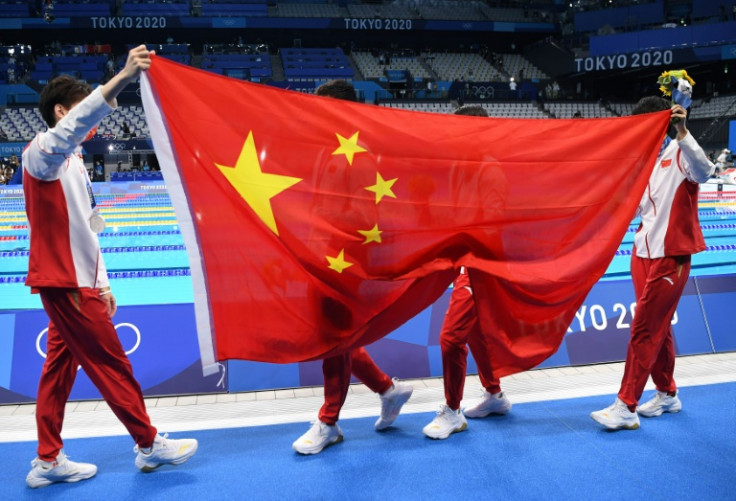China Calls Swimmer Doping Reports 'Fake News'

Beijing on Monday called reports about 23 Chinese swimmers testing positive for a banned substance ahead of the Tokyo Olympics in 2021 "fake news".
The sport was rocked at the weekend by revelations that the swimmers tested positive for trimetazidine (TMZ) -- a prescription heart drug that is banned in athletes because it can enhance performance -- before the Games three years ago.
The swimmers were allowed to compete in Tokyo after world governing bodies accepted China's findings that they had ingested it unwittingly from food during a competition in late 2020 and early 2021.
Several went on to win medals, including gold, and many are in line to compete at the Paris Olympics this summer.
China's foreign ministry on Monday hit back at the widespread reports, which first emerged in the New York Times and German broadcaster ARD on Saturday and cited a review of confidential documents and emails.
"The relevant reports are fake news and not factual," said foreign ministry spokesman Wang Wenbin.
World anti-doping agency WADA has said there was "a lack of any credible evidence" to challenge China's version of events.
"I believe you will also have noted that the World Anti-Doping Agency has put out a very clear response," Wang said.
However, the United States Anti-Doping Agency called news of the failed tests "crushing" and blasted WADA's response as "a devastating stab in the back of clean athletes".
Wang said China's anti-doping centre conducted an "in-depth and detailed" probe into the incident, which found the athletes had ingested contaminated drugs "without their knowledge".
"The Chinese swimmers involved were neither at fault nor guilty of negligence, and their behaviour did not constitute a doping violation," he told a regular press conference in Beijing.
"After an investigation, WADA affirmed the findings of the China anti-doping centre."
An Australian coach who works with the Chinese Swimming Association also rejected claims of systemic state-run doping, saying it is "so far from anything I have seen".
Denis Cotterell, who has coached drug-tainted Chinese swimmer Sun Yang, told The Sydney Morning Herald he disputed "any suggestion of anything orchestrated".
The 74-year-old has had an on-off association with Chinese swimming for more than a decade and said he was speaking from first-hand experience.
"I see what they (the swimmers) go through, I see the measures, I can tell you the stories. I know the facts and I am comfortable," he told the paper.
"The suggestion that it's systemic is so far from anything I have seen here the whole time."
Chinese state media downplayed the accusations in domestic reports and said other countries were conspiring against Beijing's national swim team.
Xinhua news agency published an article on Sunday referring to "some foreign media reports" without mentioning details of the allegations, with most of the article a paraphrase of WADA's statement.
State-owned tabloid Global Times on Monday called the allegations "slanderous accusations", suggesting that foreign media reports on the issue were part of Western efforts to block China's rise as a sporting power.
"Relevant countries are currently manipulating the issue of doping and smearing China's swimming program, clearly doing so intentionally," the Global Times said.
Discourse on China's tightly censored social media echoed state media sentiments, with internet users saying the allegations would not stop the Chinese swim team.
"Why are they targeting China's swimming team? It's because we're getting stronger and stronger," one Weibo user said.
ARD aired a documentary on the subject Sunday, with the Montreal-based WADA issuing a fresh statement afterwards.
"The agency still stands firmly by the results of its scientific investigation and legal decision concerning the case," it said.
Wang said the Chinese government "consistently upholds a resolutely zero-tolerance position when it comes to doping", adding China upholds "fair competition" in sport.
Chinese swimming has a chequered doping history. Seven Chinese swimmers tested positive for steroids at the 1994 Asian Games in Hiroshima.
In 1998, swimmer Yuan Yuan was banned after Australian customs officers discovered a large stash of growth hormone in her bags at the world championships in Perth.
Three-time Olympic champion Sun is about to finish a second doping ban. His first, in 2014, was for taking TMZ.
© Copyright AFP 2025. All rights reserved.






















